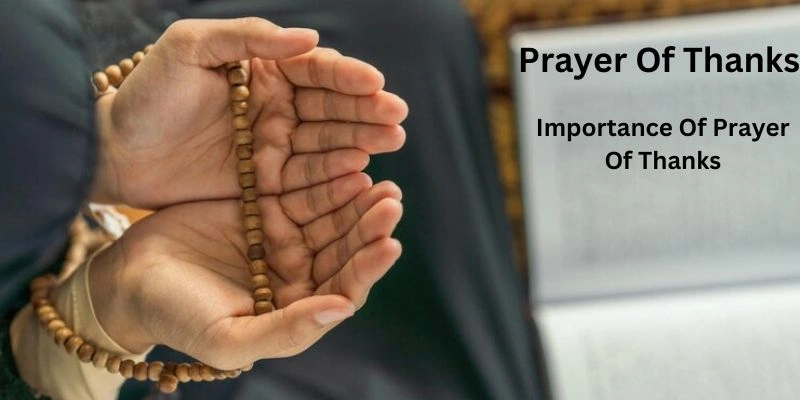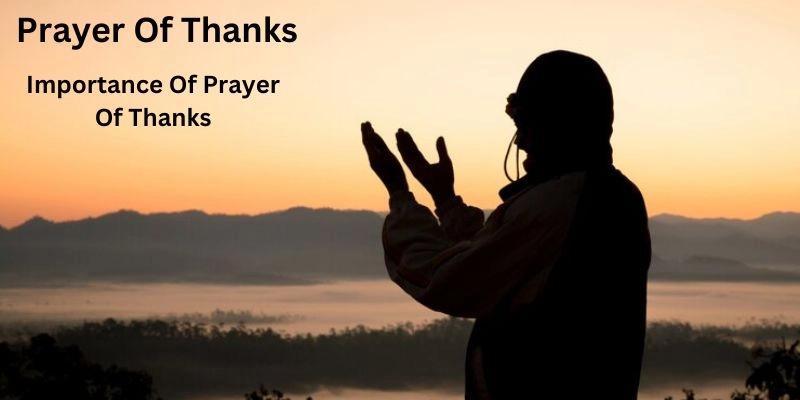Grateful Heart always offers a prayer of Thanks
Updated: March 12, 2024
114
During the busy routine of everyday life, we often overlook the many blessings that are present in our midst. However, for Muslims, showing appreciation to God (Allah) is extremely significant. This gratitude is transformed into a lovely custom called the Prayer of Thanks, sometimes also called the Prayer of Gratitude.
This prayer is not a strict collection of words, but instead a sincere recognition of gratitude for the positive aspects of life, whether they are significant or insignificant. It is a means of recognizing the many blessings we are given, from good health and supportive loved ones to the little pleasures of a lovely day.
View it as a one-on-one talk with God, where you express your gratitude for the blessings you hold dear. This introduction offers a fundamental comprehension of the Prayer of Thanks, focusing on its core and rationale.
Importance of prayer of thanks in Different Cultures and Religions
Here we discuss How Different Cultures and Religions Express Thanks Through Prayer
Around the world, individuals from different cultures and faiths recognize the significance of showing appreciation. Prayer, a crucial form of communication with a higher being or the universe, is a strong tool for expressing gratitude. Let’s explore how various religions highlight the importance of expressions of gratitude through prayer.

Religions that trace their origins back to Abraham
In Islam, Muslims show gratitude multiple times a day through brief prayers (duas) and also during their formal prayers.
Here is a verse from the Quran on the prayer of thanks: “And [remember] when your Lord proclaimed, ‘If you are grateful, I will surely increase you [in favor]; but if you deny, indeed, My punishment is severe.'” (Quran 14:7)
After eating, a popular prayer means “All praise and thanks belong to Allah (God).”
Prayer of thanks in Christianity
Expressing gratitude through prayers is integral to the Christian lifestyle. It is common to say a prayer before eating, thanking God for the food provided.
“Gratitude is not only the greatest of virtues, but the parent of all others.” Cicero
Numerous religious groups conduct unique services focused exclusively on thanking.
Gratitude in Judaism
Appreciation is a fundamental aspect of Jewish culture.
“Gratitude is the heart’s response to the Divine blessings bestowed upon us. In Judaism, the prayer of thanks, or ‘Hoda’ah,’ is not merely an expression of appreciation; it is an acknowledgment of our dependence on God’s abundant grace.” Rabbi Jonathan Sacks
The prayer “Modeh Ani” (I am grateful) is said when waking up, showing gratitude for being alive and having a new day.
Religions from the East Hinduism
In Hinduism, followers believe in the principle of “Daana” (generosity) and showing gratitude to the gods for the blessings they have been given.
“Gratitude is the fairest blossom which springs from the soul.” Swami A.C. Bhaktivedanta
Prayers frequently include giving offerings and repeating mantras such as “Om Shanti” (peace prayer) as a way to express appreciation for inner peace and good health.
Gratitude in Buddhism
Appreciation is a fundamental principle in Buddhism. Monks pray daily to express gratitude for the teachings, the Buddha, and the chance to pursue enlightenment.
“Gratitude is the fairest blossom which springs from the soul.”Buddhist proverb
Lay followers integrate gratitude into their lives through activities such as mindful meditation.
local customs and beliefs on the prayer of thanks
Numerous native cultures show appreciation through prayers and rituals that are intertwined with nature. Prayers of gratitude for a plentiful harvest, good health, and the gift of life are often accompanied by offerings to the earth, sky spirits, and ancestors.
Similarities found in various cultures for gratitude
Even though the rituals and practices vary, there is a shared connection that ties together these expressions of gratitude.
Recognition
- Appreciating the origin of blessings, whether it be a divine entity, the abundance of nature, or the assistance of family and friends.
Gratitude
- Showing genuine appreciation for positive aspects.
Psychological Benefits of prayer of thanks
Below is a description of the mental advantages of expressing gratitude through prayers, explained in simple and brief terms.
Expressing gratitude by saying “Thank You” has positive effects on the mind.
Expressing gratitude through prayer goes beyond religious tradition; it actually has tangible advantages for our mental health.

Here is the method:
Increases positivity
Concentrating on things you appreciate changes your perspective from negative to recognizing the positive aspects of life. This could result in a more positive attitude and increased happiness.
Decreases Stress
Recognizing your blessings can help alleviate feelings of stress and anxiety. Appreciating your blessings and recognizing the bigger picture through gratitude can reduce stress levels.
Enhances Sleep
A thankful mind leads to a more peaceful mind. By concentrating on the good things in your life before going to bed, you can calm down your busy mind and improve the quality of your sleep.
Strengthening relationships goes beyond just thanking God when expressing gratitude through prayer. Expressing gratitude for the individuals in your life through prayer can cultivate an attitude of thankfulness and enhance your connections with them.
Boosts self-esteem
Acknowledging your blessings and the positives in your life can enhance your sense of confidence and self-value. You begin to view yourself as someone worthy of good things.
Physical Health Benefits of prayer of thanks
Increased cardiovascular fitness
- Consistent physical activity fortifies the heart muscle, enabling improved blood circulation.
Decreased Risk of Blood Clots
- Physical activity enhances blood flow, reducing the likelihood of developing blood clots in blood vessels.
Increased Muscle Power and Stamina
- Exercise helps increase muscle mass by building and toning muscles, leading to better physical strength and fitness.
Enhanced Endurance
- Engaging in regular physical activity boosts stamina, making it easier to complete everyday tasks and activities.
Improved Balance and Coordination
- Physical activity boosts core muscle strength and enhances coordination, lowering the likelihood of falls and injuries.
Historical Examples of Gratitude in different religions
- The Bible (Old Testament)
“Enter his gates with thanksgiving, and his courts with praise! Give thanks to him; bless his name!” Psalm 100 (Expressing public gratitude during worship)
- The Quran
“And your Lord says, ‘Call upon Me; I will respond to you.'” Surah Al-Baqarah (2:152)
“And be grateful to Allah . . . If you are grateful, I will surely increase you [in favor].”Surah Ash-Shuara (26:78-79)
- The Bhagavad Gita (Hinduism)
“Whatever you do, offer it to Me; by Me it will be accomplished. Seek refuge in Me alone; free from egoism and delusion, surrender to Me.”Chapter 4, Verse 33
- The Dhammapada (Buddhism)
“He who has a grateful mind experiences perpetual happiness.”Verse 19
These examples offer only a small preview of the wide range of instances found in different religious practices. Every religion provides distinct outlooks and customs for showing gratitude to the divine or recognizing received blessings.
It is crucial to mention that this list is not comprehensive and more research within distinct religious texts may uncover numerous other examples emphasizing the importance of gratitude.
Developing a Habit of Thankfulness
It is simple to become focused on the daily routine and ignore the small blessings in our fast-paced society. Developing a mindset of appreciation can greatly enhance our health and general perspective on life.
Here is a way you can establish a regular practice of gratitude:
Harness the Power of Reflection
Take a few minutes each day, whether in the morning or at night, to contemplate the good things in your life. Reflect on the positive events, the individuals who bring happiness, and the little things you usually overlook.
Be aware
Remember to be mindful of your environment at various points during your day. Observe the beauty of nature, the intricate details of everyday objects, or the kindness of strangers. Showing up gives you the opportunity to enjoy the small pleasures that are frequently ignored.
Conclusion
To sum up, the Prayer of Thanks, or Salat ash-Shukr, is a lovely way to encourage a grateful mindset in our everyday routines. It enables us to recognize the blessings gifted to us, whether large or small, and convey our genuine gratitude to God.
By pausing to say this prayer, we enhance our relationship with the Divine, nurture feelings of satisfaction, and welcome additional blessings into our lives.
Keep in mind that a heart full of gratitude leads to happiness, and expressing thanks through prayer is a strong way to cultivate both.
Please Write Your Comments